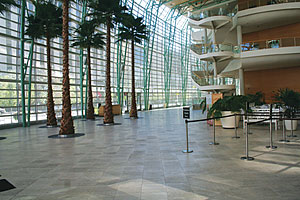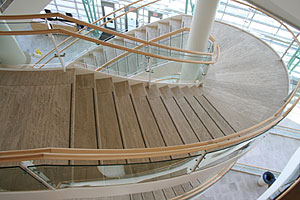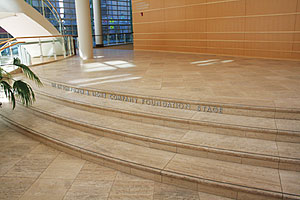
At the heart of the Benjamin and Marian Schuster
Performing Arts Center in Dayton, OH, lies the Wintergarden, which accommodates
more than 1,000 people and provides a beautiful backdrop for events with its
magnificent grove of palm trees. To protect the 15,000 square feet of Roman
travertine flooring that flows throughout the atrium, Stain-proof™ from
Dry-Treat of St. Leonards, Australia, was applied to seal the stone.
Nicknamed the “Schu,” the Benjamin and Marian Schuster Performing Arts Center in Dayton, OH, is home to the Dayton Opera and Dayton Philharmonic Orchestra as well as the latest Broadway shows. At the heart of the performance center lies the Wintergarden, which is set back in a convex sweep from the street. The spectacular glass atrium accommodates more than 1,000 people and provides a beautiful backdrop for events with its magnificent grove of palm trees. To protect the 15,000 square feet of Roman travertine flooring that flows throughout the atrium, Stain-proof™from Dry-Treat of St. Leonards, Australia, was applied to seal the stone. The product was distributed by Stone Design and professionally applied by Pro Top Design of Eaton, OH.

Stain-Proof, which was distributed by Stone Design and
professionally applied by Pro Top Design of Eaton, OH, contains specially
engineered sealing molecules that did not significantly alter the slip
resistance of the stone floor.

The travertine, which was employed for curved
balconies and stairways throughout the main lobby, restaurant forecourt and
ticket office, combines beauty and durability. Using a sealer with the longest
possible lifespan was to minimize disruptions to daily business resulting from
resealing.
• Longevity - so regular costly and disruptive re-application is not required
• Sealed surfaces should be easier to maintain and clean - withstanding commercial cleaning processes and alkaline cleaning chemicals
• Superior water and oil stain repellency
• The look and finish of the surfaces had to be retained

Stain-Proof bonds permanently inside the pores by a
process of chemical reaction - actually becoming part of the molecular
structure of the treated tile. As a result, Stain-Proof does not have to be
re-applied regularly, according to Dry-Treat.
Stain-Proof also offered long-term savings in maintenance costs. Because the sealer bonds permanently deep inside the pores, Dry-Treat reports that it is not damaged by standard commercial cleaning techniques or heavy-duty alkaline cleaners. Expensive proprietary cleaning chemicals and special complex cleaning techniques are not necessary to preserve the sealer.
